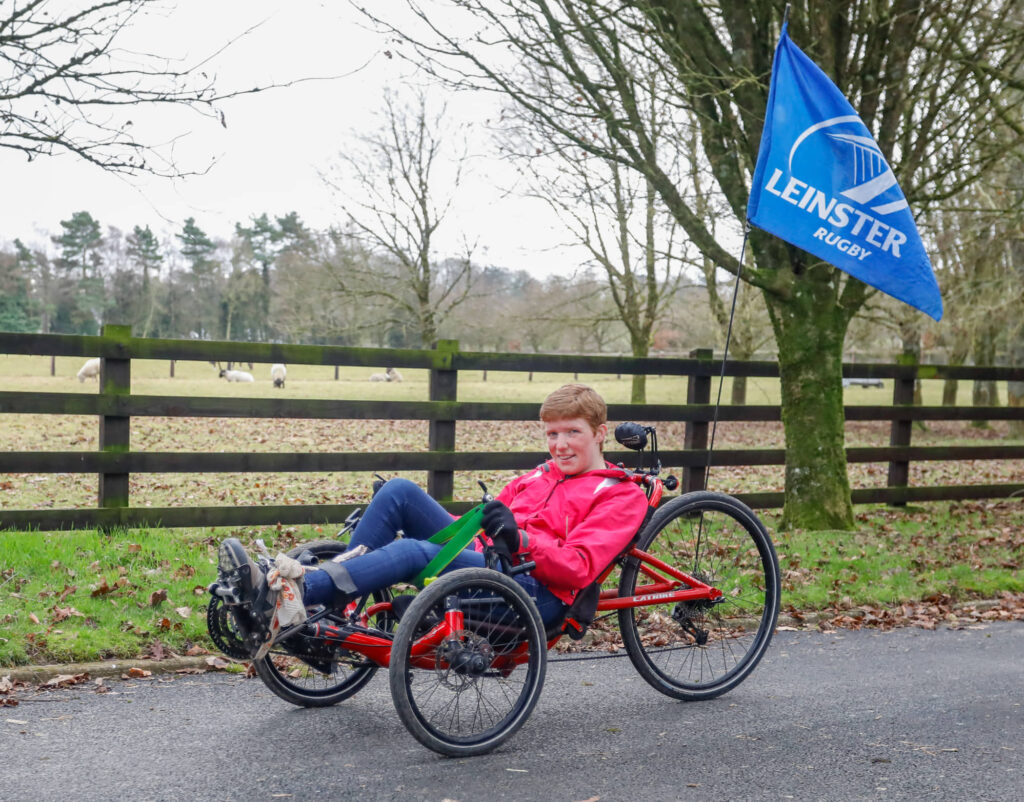Living with Friedreich’s Ataxia: My experience with mobility and communication barriers
June 2025In this interview led by Matt Bolz-Johnson, our ATMP and Mental Health Advisor, Brona Kearney shares her experience with Friedreich’s Ataxia (FA), a progressive rare disease she was diagnosed with at a young age.
Brona describes how what began as a distant and unfamiliar diagnosis evolved into a gradual loss of independence. She shares the physical and emotional challenges that Friedreich’s Ataxia brings to her daily life – and how, through assistive technology and a sense of connection with others, she found strength, purpose, and a renewed drive to turn her experience into a force for change.

Brona Kearney’s testimony
My journey with Friedreich’s Ataxia (FA) began when I was diagnosed at 10 years old, which was 23 years ago. At first, the diagnosis didn’t really mean much to me because I didn’t understand it. FA is progressive, meaning what you can do keeps changing. When you think you have gotten to understand FA, something new happens.
My symptom of “scoliosis” led to many diagnoses, although I had some symptoms like dropping things, balance issues, falls, and trouble running, which I didn’t realise were connected.
When diagnosed, I could still run short distances. I’m now a full-time wheelchair user, and although people often think the wheelchair is the biggest change, it’s not. You can adapt to a wheelchair as it becomes just another tool to get around. The real challenge is that FA doesn’t stop at the legs. It affects my upper limbs, my speech, my hearing, my eyesight and it touches every part of my independence.
Losing my speech and my hearing has had a huge impact on my mental health. Walking into a crowded room and realising I can neither hear properly nor speak clearly is incredibly isolating. In my daily life, I have become increasingly dependent, I can’t cut my food, transfer between seats, go to the bathroom without help or get out of bed without help. It’s a level of vulnerability that’s hard to put into words.
At the same time, technology has given me a lifeline. I work four days a week, using adapted computers and assistive tech. I’ve found small victories in things like screen readers or mouse and keyboard alternatives that allow me to stay connected and independent in ways that weren’t possible before.
Mental health remains a daily battle, but I’ve found strength through purpose. I’ve started documenting the barriers I face, hoping that by sharing them, I can help others avoid the same pitfalls. Whether it’s accessing adaptive technologies or pushing for new treatments, I want my experiences to make things a little easier for the next person.
Community has been essential too for my mental health. When I started a FA registry in Ireland, it helped give me a purpose and feel less alone, with over 90 FAers on it now. It reminded me that, as isolated as FA can make you feel, we’re not alone, and when we advocate together, especially as new therapies emerge, our voices are stronger together.
A quote I find such inspiration in is “Acting alone, there is very little any of us can accomplish. Acting together, there is very little we will not accomplish!” (Ron Barteck, FARA).
Even now, stigma and misunderstanding can be exhausting. I remember when I first needed to use lifts or disabled parking spaces, people made comments because I “looked healthy”. You feel judged just for trying to exist. Over time, I had to accept that I couldn’t live up to other people’s expectations. I needed to build a life based on what worked for me, not what others assumed.
Things like hydrotherapy, riding my trike and horse riding still give me a sense of freedom. They’re my escape. Without them, I honestly think I’d feel trapped inside the house, and inside myself.
I won’t pretend it’s easy; losing the ability to do basic things, drifting away from friends who move on with life milestones, seeing my sister also living with FA and knowing what’s coming next. But finding purpose, staying connected to the community, and having a strong support system have been the anchors that keep me going.
At the end of the day, what helps my mental health most is turning the hard parts of my journey into something useful for others, making sure no one else has to face the same battles alone.
EURORDIS will continue publishing testimonies obtained from advocates living with a rare disease who have kindly shared with us their experiences of the impact of having a rare disease on mental wellbeing and their hopes for the future.
If you would be willing to share your own personal story as one of our testimonies, please contact Matt Bolz-Johnson, our Mental Health & Wellbeing Lead, at matt.johnson@eurordis.org.
Our last testimony was from Alessandra Tolaccia, who shared her journey through misdiagnoses and medical dismissals, which ultimately led to her diagnosis of Osteogenesis Imperfecta (OI), an invisible illness.
Visit our Mental Health & Wellbeing webpage to read upcoming articles from our series of testimonies.
